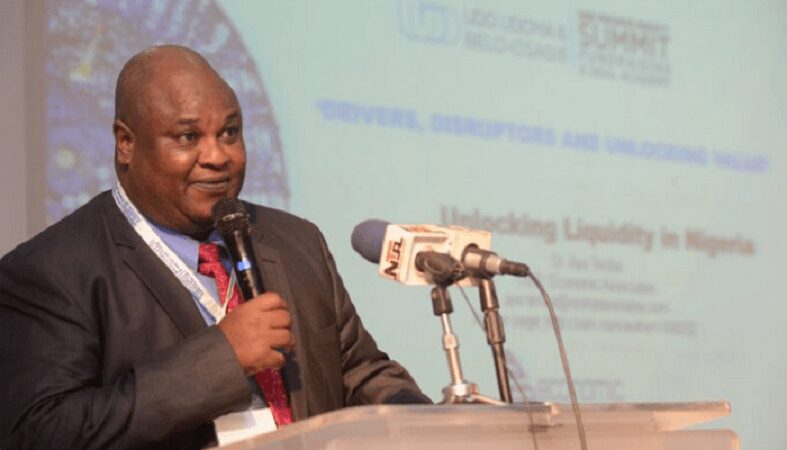The federal government has been advised to securitize its stakes in the Nigerian LNG Ltd and oil joint ventures through issuing of bonds.
This follows the speculation by Bloomberg and other analysts who predicted the devaluation of the Naira in 2021 due to the country’s debt profile and the fall in its foreign reserves to $37.3 billion in February 2020.
Advertisement
The government hopes to fund its fiscal deficit of N2.18 trillion ($7.2billion) through debt, which is 1.52% of Nigeria’s GDP.
The government had in 2019 said it would reduce its stakes to not less than 40% in the NLNG where it has 49% equity and in joint ventures where it has between 55% and 60% equity in Shell, Chevron, Total and ExxonMobil respectively.
President Muhammadu Buhari said the move became necessary due to shortfall in the overall performance of the 2018 budget which was only 55% of the target.
The Chief Executive Officer of Economic Associates, Ayo Teriba, in an interview with THE WHISTLER said that the pressure on the Naira was the least challenge facing the economy, adding that there was pressure on several aspects of the economy.
Advertisement
He lamented the inadequacy of the country’s reserves and called it “the most alarming” of the pressures on the economy, adding that the government had ignored other options at its disposal to improve the country’s reserves.
“There is pressure on several aspects of the Nigerian economy and the pressure on the currency is the least important.
“The inadequacy of the country’s reserves is the most alarming and the government has neglected several options of shooting up its reserves.”
Teriba added that the government prioritised borrowing over securitizing the country’s financial assets in the NLNG and its oil ventures.
“The government is trying to borrow externally rather than securitizing the country’s financial assets like the FG equity investments in the Nigerian LNG Ltd and other oil joint ventures.”
Advertisement
Teriba argued further that government’s shares in financial assets of the country was over $50 billion, saying however that even though the assets were not liquid, the government could securitize them to make them liquid.
According to him, the government can issue $20 billion as securities based on its equities in NLNG, Shell and Chevron and Exxon Mobil, where it has 49%, 55% and 60% equity respectively, as the dividend realized from the companies will “pay the securities and the country will be out of the pressure.”
The Economic Association C.E.O. said the country was in a much stronger position to raise funds “as long as Nigeria has the option of securitizing its equity investments in NLNG and other oil sector joint ventures, the Naira prospect is very bright.”
Teriba maintained that accumulating external debt of $3 billion from the World Bank or $16-17 billion from China was not a viable remedy to the pressure on the economy, especially when the FG could internally raise $30 billion or more.
He however warned that the Naira would be pressurized and consequently devalued if the government failed to back the reserves with its shares in the oil sector.
“The Naira does not have to fall under pressure, but if the government fails to leverage its own equity ownership, the Naira will be exposed to danger,” he said.
Advertisement
He also called on the government to give opportunity to Nigerians investors to invest in in its “assets either through outright equity sales like Saudi Aramco did in 2019, or through securitization that is based on those assets,” Teriba said.
He however did not advocate for outright sales in the country’s equity in the NLNG and other joint ventures.
Teriba further called on the government to restrict the securities to Nigerians at home and in diaspora based on the 49%, or the percentage it has in the oil joint ventures, since foreigners already owned 51% in NLNG, 45% in Shell and 60% in Chevron and ExxonMobil.
What Nigeria will gain from securitizing NLNG and Oil Venture assets
Terbia called the move a way of “eating your cake and having it.”
According to the economist, investors will see the securities issued to them as an “investment opportunity to earn return on an NLNG asset and not as a loan.”
It will stabilise the foreign exchange market, stabilise the exchange rate and money will stay in the domestic financial market.
Consequences of not securitizing the assets
The expert warned that there will be shortfall in liquidity in the country’s domestic financial market due to investor apathy, consequently financial institutions will not have enough funding.
“Money will not stay in the domestic financial market when people are speculating that there will be devaluation and banks will not get the money investors are planning to spend in the near term.”
The Naira would fall under pressure to be devalued
Teribo said to avoid unnecessary doubt among Nigerians, “the FG can call it ‘SUKUK’ for better understanding among Nigerians.
“Where a case can be made for selling government equity in an enterprise which the government owns 100% equity, then they can replicate the NLNG approach in which FG owns 49%, while investors own 51% equity.
“However, in the enterprises that FG owns minority stake, the government should not sell its stake,” he added.



